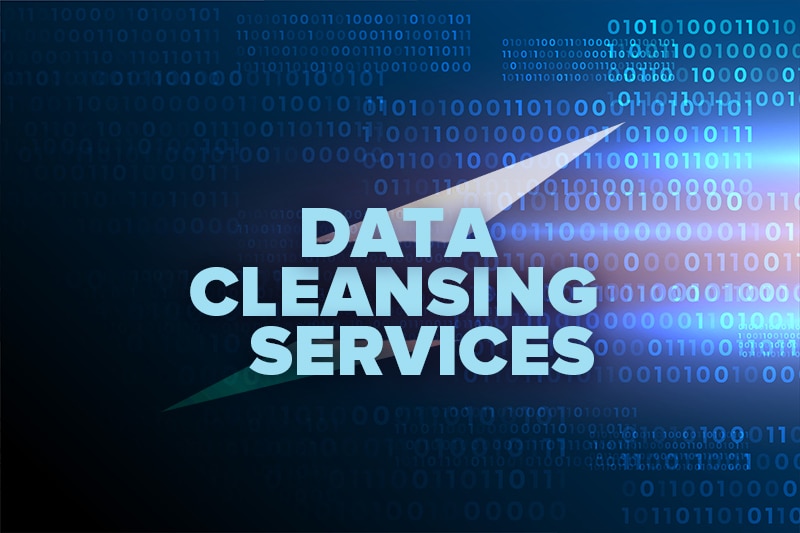Even though small enterprises together make a significant impact in business world, they sometimes have little budgets or resources when working alone. They run the risk of a data explosion when they produce various sorts of data. Small business owners therefore need to be attentive of every dollar. Data cleansing is the best strategy to maintain the data’s cleanliness, organization, and security. It focuses more on updating, correcting, and consolidating data to ensure your system is as effective as possible. Therefore, small businesses can utilize data cleansing services to ensure that their customer information is suitable for use by enterprises, enables analytics, streamlines business operations and keeps up with changing market conditions.
Where to Use Data Cleansing Services
Types of issues or areas where data cleansing is vital are as follows.
- Invalid or missing data and typos: These are structural errors in data sets that need to be corrected via data cleansing. Examples include wrong spellings, typographical errors, syntax errors, missing values, and wrong numerical entries.
- Duplicate data: Data cleansing identifies and removes/merges duplicate data in data sets by using deduplication measures.
- Inconsistent data: Different systems may use different formatting styles, which results in diverse formatting or inconsistency in important data such as names, addresses, and other details. Data elements such as identifiers and terms could also vary from one system to another. Such inconsistent data can be made uniform with data cleansing so that data analysis can be accurately done.
- Irrelevant data: There could be data that is not relevant to analytics applications or could even distort their results. Such redundant data can be removed from data sets through data cleansing. This in turn helps to streamline data preparation and reduces the amount of data processing and storage resources requirements.
Reasons Why Data Cleansing Is Important for Small Businesses
Having organized and clean data helps small businesses to have pragmatic, economical and legal benefits. Apart from legal considerations, there are both pragmatic and economic benefits to making sure the data you retain is reliable. The advantages of data cleansing apply to businesses of all sizes, even if you run a small or medium-sized organization (SME) and have never thought about cleaning up your database. Small firms may perhaps notice the cost benefit more strongly than a larger company. Here are some of the reasons why data cleansing is important for small businesses:
- Costs are overall reduced by data cleaning: Duplicate data clogs up the workplace and finally results in ineffective operations. Operations need to be as efficiently streamlined as feasible for businesses. Higher earnings are a result of lower total costs. Data cleansing will also help managers decide on roles inside their department. Regular updates to job descriptions are necessary, but the issue is that clutter hides this need. But with proper data cleansing, businesses can avoid any clutter. Businesses will be better able to spot new opportunities if they mix the right analytics and cleansing technologies.
- Eliminate redundant data to streamline procedures: The quality of the data is compromised by duplicate records. These errors typically happen during the collection process. Duplicate records will be a much bigger issue if this data is being entered by people. Due to the management’s reliance on inaccurate statistics, duplicate data results in poor decisions. It is occasionally preferable to outsource data cleansing in order to remove duplicate data because doing so calls for a particular kind of cleansing. Experts are better suited to delete these records. Duplicate removal will streamline business operations and increase efficiency.
- Protect your data investment: Data intelligence requires a substantial investment, so that the data can be safeguarded. All of your money will be wasted if you don’t protect the data. Without a comprehensive data cleansing procedure, your reports will start to become erroneous and ultimately worthless. A database will eventually get so damaged that cleaning it up will cost more money than starting over. Your investment shouldn’t be wasted. Create a sound data cleansing strategy to avoid losing a valuable asset. Businesses are bound to fail if they don’t have a data analytics plan. In this overarching plan, data purification is crucial.
- Boosts email campaigns’ return on investment: Sometimes a company would use obsolete data for email campaigns despite having it on hand. This may result in a number of unforeseen costs. Making sure the proper people are joining your email list through data cleansing. Businesses frequently send emails to the incorrect recipients who inadvertently ended up on their mailing list. This is considered spam. It is crucial that you are focusing on the correct demographics because people also flag email from senders they do not recognize as spam. Nothing is as unprofessional as a firm targeting the wrong individuals with their email campaign.
The process of data cleansing varies from database to database and there are many steps and tools available to cleanse your data. You can learn more about the data cleansing tools in the link given below.
| Read: What Are The Best Data Cleansing Tools |
Data Cleansing Steps
While different techniques and different tools are appropriate for various databases, here are the steps involved in data cleansing.
- Monitor mistakes: A business of any size must keep reliable records. It’s much more crucial if your operational budget is smaller than that of a Fortune 500 company. You should keep track of your data monitoring and search for patterns regarding where your company’s faults are occurring most frequently. This will make locating and fixing inaccurate or corrupt data much simpler. If you’re connecting other solutions with your company software, error monitoring is essential to prevent delays in work being completed by other departments.
- Check for Duplicate Data issues: Duplication of data is a huge problem: To save time when evaluating data and managing your marketing and sales, find duplicate contact records in your database. By looking into and purchasing various data cleansing solutions that can examine raw data in bulk and automate the process for you, you can make this less of a hassle.
- Verify and maintain the accuracy of the data: Verify the accuracy of your data once you’ve cleaned up your old database and removed duplicate records. You should check your data records for accuracy, clarity, and specifics. If you don’t check your data, you run the danger of making a decision based on flawed data that isn’t truly representative of the current situation. It is best to look into and make an investment in real-time data cleaning solutions. Even today, some tools employ AI or machine learning to verify accuracy more effectively.
- Evaluate results: Use third-party sources to augment your data after it has been tracked, checked for duplications, standardized, and validated. Reliable third-party sources can collect data directly from first-party websites, clean the data, and then compile it to give business intelligence and analytics a more complete view.
- Standardize data entry procedures: Consider the effectiveness your team would experience and the savings you would experience as a small business owner. When you standardize the process of data entry and evaluate its significance, you may make this a reality. By standardizing your data process, you can ensure a reliable point of entry, lower the possibility of duplicate data, corrupt records, and other dirty data problems, and more.
Making smarter decisions is one of the major benefits of having access to clean data for businesses. As a result, they have an advantage over rivals in the marketplace. Companies are unable to get the insights necessary to make wise business decisions when their data is unreliable, which leads to a loss of leads and increased financial waste. Therefore, it is crucial for businesses to invest in data cleansing services that can aid small businesses in cleaning up the data, allowing them to make wise decisions that will increase the returns on their marketing investments.




